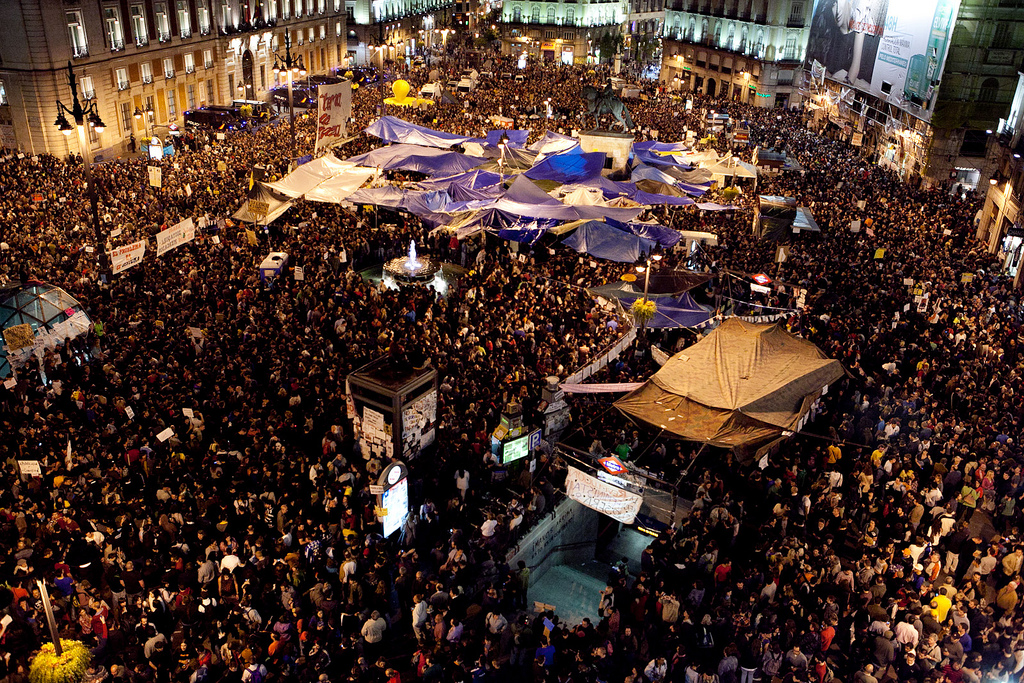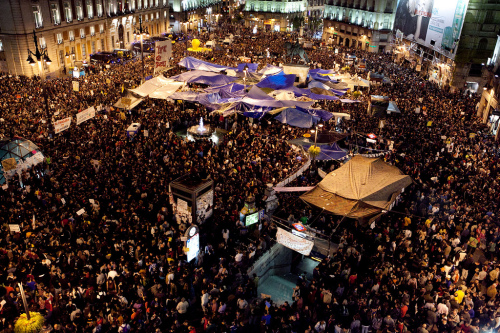The City Open Interface Conference

> Summary
> Programme

Photograph: Julio Albarrán (CC license)
Summary
On 15 May 2011 a group of people gathered at Puerta del Sol in Madrid, the city’s central and most famous square. They had attended a public demonstration some hours previously which took over the city streets in protest over the political management of the economic crisis. Some people then made a decision to spend the night in the open air at the square. Within hours the gathering quickly developed into an established encampment, whose Twitter hashtag would in the course of the following months become an emblem for a new form of political and urban innovation: #acampadasol.
#acampadasol is a vibrant example of what we refer to as 'the city as an open interface'. Spurred by innovations in information and communication technologies, and in particular in the so-called free culture of digital media, the form and development of #acampadasol attests to an emerging reconfiguration of the social and infrastructural assemblages making-up cityscapes. #acampadasol is an eventful manifestation of what some people have referred to as 'peer to peer urbanism': the production of new open, collaborative and prototypical forms of urban sociality. The camp became an 'open interface' for a variety of social and political forms of expression. It offered a temporary site for the grounding of 'openness' as a form of urban cultural economy.
This two-day seminar explores the rise of new technologies and material practices of intervention in and appropriation of urban spaces. It takes a closer look at the idea of the city as an open interface, and at ‘openness’ itself as a novel cultural idiom for political and social innovation. The cultural economy of openness is of course taking a diversity of shapes and forms:
There is for example an economic geography of open innovation and creative projects, such as the emerging urban spatial economies of free software or new digital media firms. Openness stands here for particular forms of organizational culture, where the lines distinguishing the users and producers of products, services and experiences is tenuous and in ongoing negotiation. The boundary between collaboration and competition becomes similarly fuzzy. Open innovation firms exact their own infrastructural requirements on ‘creative cities’. The culture of open innovation may not necessarily transpose neatly onto the city. The economics of openness may well be generating new geographies of closure.
Urban cartographies are of course also being transformed by a cohort of emerging digitalscapes, including a variety of digital platforms where GPS technology enables user-generated content to layer and enrich cartographic information. These cartographies are no doubt transforming the consciousness of the urban experience, but they are also likely to produce novel forms of geographical and social inequalities. The digitally-layered city may not be topologically accessible for all.
An interesting development of the free culture movement is its transposition and incorporation by squatter centres and established autonomous and self-organised communities, as attested for example in the rise of new ‘urban hacktivist’ communities. These spaces have become experimental grounds for articulating the new politics of ‘free (digital) culture’ with the claims and aims of more traditional social movements.
An example is the complex negotiations around the rise of a digital commons movement. Arguments for a digital commons are sustained on the negligible costs of reproducing and modifying digital information. The view remains of course contested by much legal and economic thinking, not least around questions of intellectual property rights. But an interesting development relates to the ways in which cityscapes are themselves being ‘commoned’ through new open media and infrastructures. Citizens and community members are ‘wiring’ the landscape of their communities with the devices, networks or artefacts that they deem worthy of local attention or concern. Public spaces become techno-material artefacts that citizens take upon themselves to service and maintain. Such ‘commoning’ of the urban condition challenges however state visions of urban public space. The public and the commons may turn out to activate and inhabit very different urban spaces.
- Urban infrastructures are also undergoing important ‘open’ transformations. The work of some media and architecture artists, for example, who work with local communities to recycle urban waste materials, is challenging in interesting ways the taken-for-granted circulatory and spatial economies of cities. The materiality and cyclical economy of waste offers an illuminating counterpoint in this context to the allegedly open economy of digital flows: for opening-up the city as a digital interface may require also the simultaneous closure or blocking of a series of physical circuits.
The seminar is part of a three-year long research project funded by the Spanish Ministry of Science on the Cultural economies of open innovation in cities. The members of the research team are: Alberto Corsín Jiménez (PI), Adolfo Estalella, Juan Freire, Juan Mateos-García, Penny Harvey, Tiago Saraiva.
Programme
05.07.2012
10:00h Welcome
SESSION 1. SOCIAL/DATA
10:15h - 10:50h: Citizenship and Crowdsourcing in Dataville, James Holston, University of California, Berkeley. [+info]
10:50h - 11:25h: The Art of Software Cities, Christian Ulrik Andersen [+info]
11:25h - 11:50h: Coffee break.
11:50h - 12:25h: Nature and Implications of Changing Epistemic Infrastructure in Cities, John L. King, University of Michigan [+info]
12:25h - 13:00h: Living Cities, Living Data: The Foreclosure of Digital Cities, Mike Crang, Durham University [+info]
13:00h - 15:30h: Lunch
SESSION 2. CARTOGRAPHIES
15:30h - 16:10h: Countergeographies, Open Interfaces and the New Military Urbanism, Stephen Graham, University of Newcastle [+info]
16:10h - 16:50h: The Politics of Counter-Mapping or Hacking Spaces and Opening Codes: Stories of Cartographic Productions by Urban Social Movements, Maribel Casas and Sebastian Cobarrubias, University of North Carolina, Chapel Hill [+info]
16:50h - 17:30h: Enacting Streets, Evelyn Ruppert, Open University [+info]
06.07.2012
SESSION 3. OPEN ASSEMBLAGES
10:00h - 10:45h: Staging Controversy: Open Urban Forums in Postearthquake Chile, Ignacio Farías, Social Science Research Center Berlin
10:45h - 11:30h: The Interior Design of the Right to the City: The Atmosphere, Rhythm and Circuitry of #Occupation, Alberto Corsín Jiménez & Adolfo Estalella, Spanish National Research Council [+info]
11:30h - 12:00h: Coffee Break
12:00h - 12:45h: The Occupation of Squares and the Squatting of Buildings: Lessons From the Convergence of Two Social Movements, Miguel A. Martínez López and Ángela García Bernardos, Universidad Complutense de Madrid.
13:00h - 14:30h: Lunch
SESSION 4. URBAN SMART
14:30h - 15:10h: From the Needle to the Urban Factory: Analysing the Limits to Capital and Revolt in the Smart City, Ramon Ribera-Fumaz, Universitat Oberta de Catalunya
15:10h - 15:50h: Cloning the Cooperative: Genetics and the Global Circulation of Californian Oranges, Tiago Saraiva, Institute of Social Sciences, University of Lisbon & University of California, Berkeley [+info]
15:50h - 16:30h: Climate Change, Smart Cities and the Promise of ‘Open’ Energy, Hannah Knox, CRESC, University of Manchester [+info]
16:30h - 17:30h: Closing remarks and future plans



 Medialab-Matadero Madrid
Medialab-Matadero Madrid